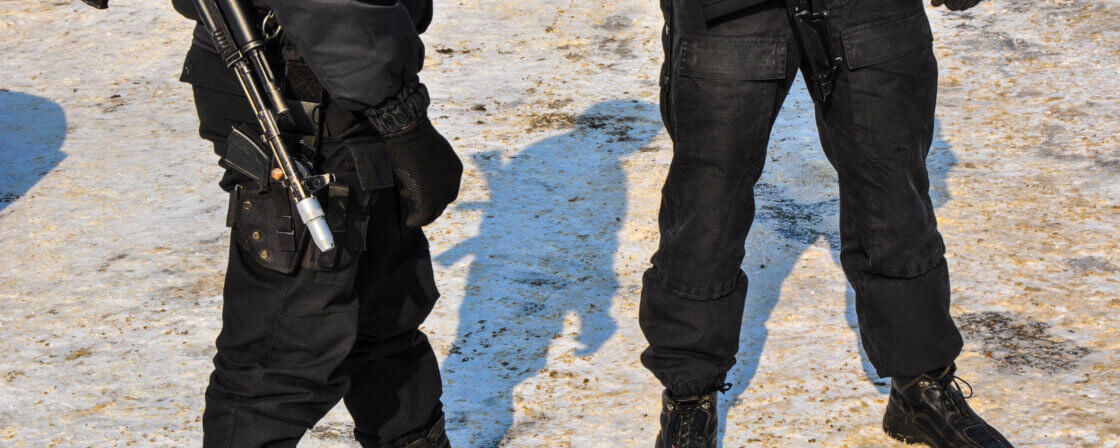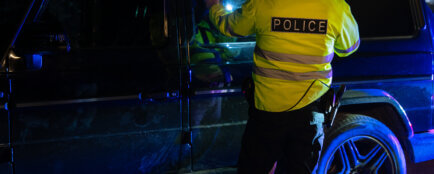Legitimate use of a weapon as a circumstance precluding illegality
The lawful use of a weapon is one of the circumstances precluding unlawfulness. It is a circumstance which results in an act which would otherwise be considered criminal not being considered unlawful because, given the circumstances, it is an exceptional situation recognised by law.
An example would be a situation where you physically assault another person. Ordinarily, this would be a misdemeanor or felony. However, if the assault was in self-defense , for example, in a situation where the person was threatening you with a knife, this would be a circumstance that would preclude illegality.
In total, there are five types of circumstances precluding unlawfulness:
- extreme emergency,
- necessary defense,
- consent of the victim,
- permissible risk,
- justified use of the weapon.
Are you solving a similar problem?
Are you dealing with a situation involving a circumstance precluding illegality?
Describe your problem to us and we will prepare a legal analysis within 48 hours. We will prepare an offer of legal representation and we will fight hard in court to enforce your rights.
I want to help
- When you order, you know what you will get and how much it will cost.
- We handle everything online or in person at one of our 6 offices.
- We handle 8 out of 10 requests within 2 working days.
- We have specialists for every field of law.
The lawful use of a weapon applies primarily to members of the armed forces and members of the security forces in the exercise of their profession. This includes, for example, the prison service, the intelligence services or members of the army of the Czech Republic. In this article, we will focus on the Police of the Czech Republic, which you are most likely to encounter as an ordinary citizen.
The Criminal Code defines the legitimate use of a weapon sparingly: A criminal offence is not committed by a person who uses a weapon within the limits set by another legal regulation. We will now break down the various points of this definition:
Weapons
Here it is necessary to define what exactly constitutes a weapon. The definition of a weapon varies in different laws. In some cases, almost anything that can significantly harm a person can be considered a weapon. In the case of the Police, however, it includes firearms including ammunition and weapon accessories, stabbing and cutting weapons, explosives, special explosive objects, breakthrough pyrotechnic devices and special charges.
Each member of the Police of the Czech Republic carries a 9×19 calibre pistol. They also have submachine guns, which they carry only in certain cases (for example, when supervising demonstrations). Police officers also use other weapons according to the specifics of their intervention (explosives are used, for example, to force open doors).
The use of coercive means must then be distinguished from the legitimate use of a weapon. These are used to ensure compliance with the law or public order. These include:
- grabs, holds, punches and kicks,
- tear gas, electricity or other similarly temporary incapacitating means,
- baton and other means of striking,
- a throwing device in the nature of a firearm with temporarily incapacitating effects,
- a throwing device not in the nature of a weapon,
- a stopping belt, a vehicle barrier and any other means of forcibly stopping a vehicle or preventing the vehicle from leaving,
- vehicle extrication,
- shield pushing,
- pushing by horse,
- service dog,
- water sprayer,
- blast blast,
- firearm strike,
- threat of pointing a firearm,
- warning shot,
- handcuffs,
- a means of preventing spatial orientation.
Use of the weapon
The use of a weapon should be the most extreme solution. First and foremost, the officer should ask the person to stop the illegal act with a warning that if he or she fails to do so, the officer will use law enforcement. If this challenge with a warning does not work, the officer should primarily choose law enforcement. Thus, the use of a weapon should be reserved for situations where law enforcement does not work or for situations where it cannot be used.
A police officer is not always required to use a warning. For example, in a situation where his life or the life of another person is threatened and action must be taken immediately.
When a police officer may use a weapon
Specifically, a police officer may use a weapon in the following situations:
In necessary defence or in extreme emergency
That is, in situations where the officer’s life or the lives of other persons are threatened and the situation cannot be handled in any other way.
Example. Although he first attempts to use pepper spray and warning calls, the perpetrator continues the attack with a threat to the officer’s life. In this situation, the officer could use a weapon to protect his or her life.
Failure to obey a call to surrender
If the dangerous offender against whom the officer is intervening fails to surrender when challenged or is reluctant to leave his or her hiding place.
Example: a police officer is at a location where a dangerous criminal suspected of armed robbery is hiding. Despite repeated challenges, the perpetrator refuses to surrender and is prepared to defend himself. In this situation, the officer could use his weapon to prevent escape and ensure safety.
Stopping a dangerous offender from escaping
To prevent the escape of a dangerous offender who cannot be apprehended by other means.
Example: a police officer is at a gas station where an armed robbery with murder has occurred. The perpetrator tries to escape and ignores police attempts to stop him. He runs towards a densely populated area. An officer could use a weapon at this point to prevent the escape and minimize the risk to the public.
Overcoming active resistance
If active resistance aimed at thwarting the officer’s serious action cannot otherwise be overcome, the officer may use a weapon.
Example: a police officer intervenes in a fight between two groups of people in a public place where weapons are being used. Although the officers use warning shots and attempt to disperse the crowd, some of the participants still continue to behave aggressively and assault each other. In this situation, a police officer could use a weapon to stabilize the situation and prevent further escalation of violence.
Violent attack on a guarded object
A police officer may use a weapon to repel a violent attack that threatens a guarded or protected object and/or area.
Example: a police officer is guarding an ammunition depot which is an important security object. During the night hours, a group of armed perpetrators attempt to break through the protective barriers and gain entry into the warehouse. The officer first uses warning calls and coercive means such as tear gas or sound grenades to stop the perpetrators’ attempts to break in. However, this does not work and the perpetrators continue with their intention to get to the ammunition. Therefore, in this situation, the police officer has the right to use a weapon against the perpetrators.
Apprehension of the irresponsible driver
A police officer may use a weapon if there is no other way to detain a vehicle whose driver, by reckless driving , is seriously endangering the life or health of persons and fails to stop on repeated summons or a signal given under any other law.
Example: a police officer is following a driver who is speeding, ignoring traffic lights, overtaking at full speed, and showing signs of drunkenness behind the wheel. Even after repeated calls and efforts to stop, he continues to drive dangerously, endangering other road users. In this situation, an officer could use a weapon to stop the irresponsible driver and minimize the risk of an accident.
Failure to obey a firearm warning
A police officer may use a firearm if a person against whom a law enforcement officer has used the threat of a firearm or a warning shot disobeys his or her command to ensure the safety of himself or herself or another person.
Example: a police officer is attempting to apprehend an armed offender who is threatening other persons with a stabbing weapon. The officer repeatedly calls for the offender to put down his weapon while pointing a firearm at him. However, the offender continues to make threats and is not prepared to surrender. In this situation, the officer could use the weapon to minimize the risk to other persons and prevent further danger.
Disposal of an animal threatening human life
An officer may use a weapon to disable an animal threatening the life or health of humans.
Example: an officer is in a park where a feral dog has attacked a group of people and is attacking them. In this situation, the officer could use a weapon to disable the dog and protect the lives of the people.
Rules for using a weapon
When using a weapon, a police officer must follow several rules:
- When using a weapon, a police officer must exercise the necessary caution, especially not to endanger the life of other persons and to spare as much as possible the life of the person against whom the action is directed. This means that, if possible, he will not aim at the heart or head of the offender, but at less important parts of the body, such as the hands or feet.
- Following the use of a weapon in which a person has been injured, the officer shall, as soon as the circumstances permit, render first aid and provide medical treatment to the injured person.
- A police officer shall immediately report to his or her superior the action in which a weapon was used and make an official record of it, indicating the reason, course and result of its use.
- The head of the police department is then obliged to notify the competent public prosecutor without undue delay about the injury or death of a person or about damage, not insignificant, caused by the use of a weapon.
Summary
The lawful use of a weapon constitutes one of the key circumstances precluding unlawfulness. It applies primarily to the armed forces and security forces, including the Police of the Czech Republic. A police officer may use a weapon in cases of extreme emergency or necessary defence, disobeying a call to surrender a dangerous offender, apprehending a dangerous offender before fleeing or overcoming active resistance aimed at thwarting a serious intervention.
When using a weapon, a police officer is required to exercise increased caution to avoid endangering the lives of others and to minimize the risk to the offender, for example, by aiming at less critical parts of the body. Following the use of a weapon that results in injury, the officer must ensure that first aid and medical treatment are administered. Any use of a weapon must be immediately reported to a supervisor and documented, and the appropriate prosecutor must be notified of the injury or death of the person.




